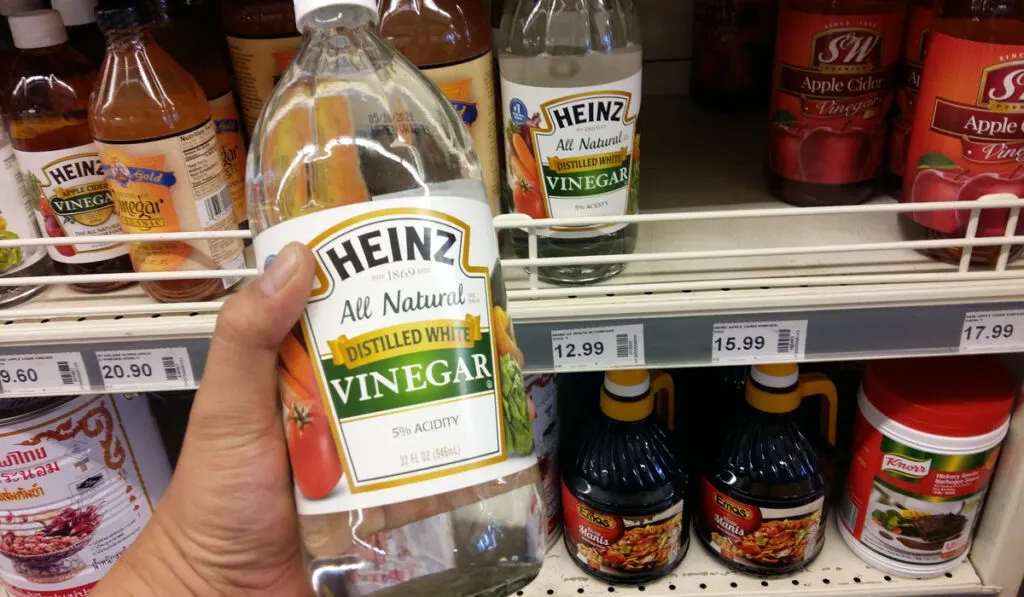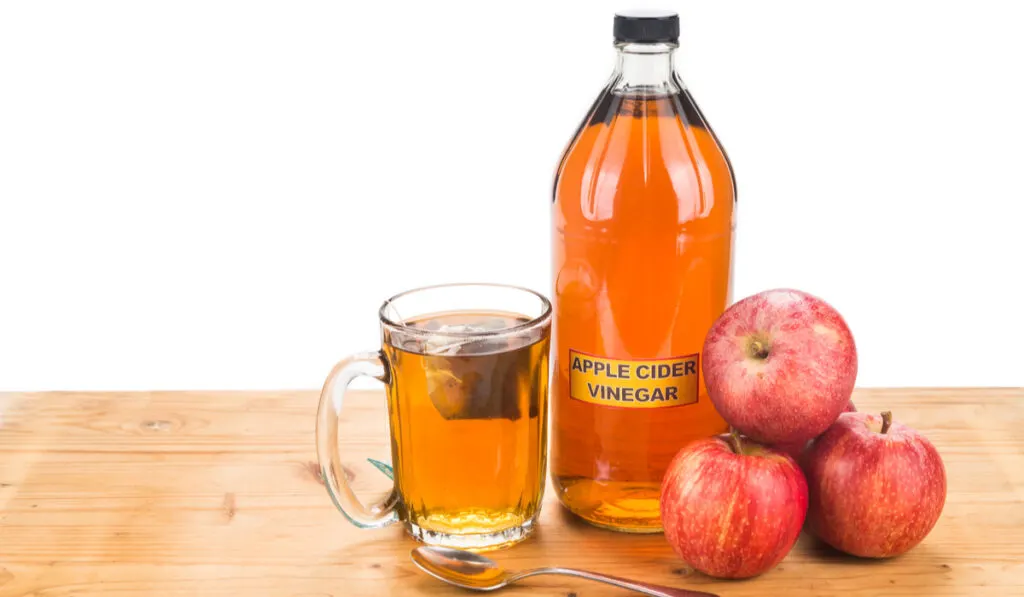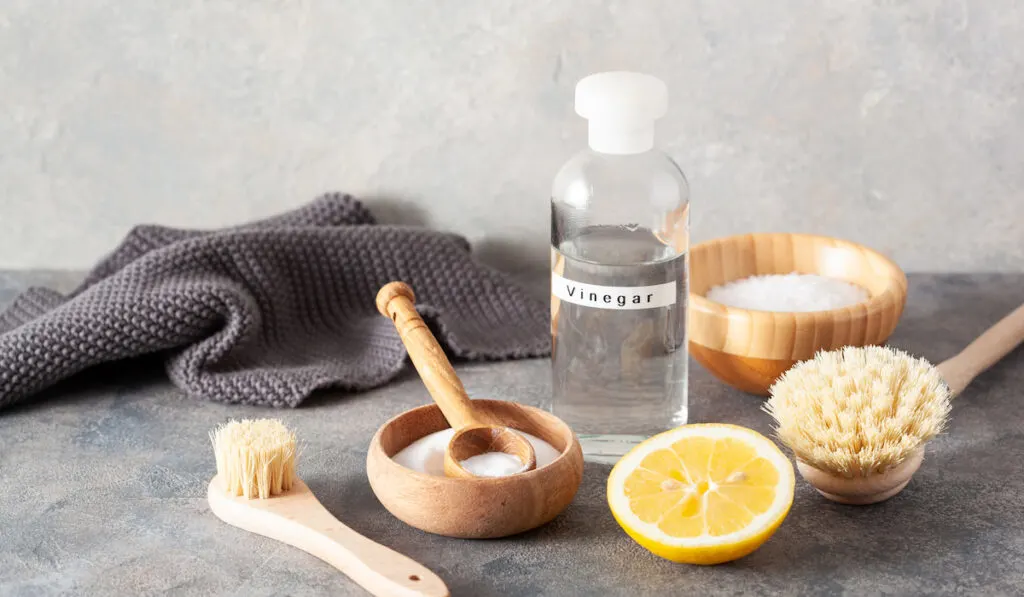There are four common types of vinegar used for cleaning including:
- Distilled white vinegar
- Apple cider vinegar
- Cleaning vinegar
- Industrial vinegar
Distilled white vinegar is considered the best vinegar for household cleaning with its versatility to clean almost any surface and its clear appearance to avoid staining.
Apple cider vinegar is also good for household cleaning, but cleaning and industrial vinegar should be used with caution as they have a much higher acetic acid content.
Although there are a plethora of other kinds of vinegar on the market including red and white wine, balsamic, champagne, and rice vinegars, these four are the ones considered best for cleaning while the others mentioned are more commonly used for consumption.
In this article, we’ll provide you with information on the four different types of vinegar to use for cleaning, what type of cleaning they are used for, and what their composition is.
Table of Contents
1. Distilled White Vinegar

White vinegar, also known as spirit vinegar, is made from fermented cane sugar or common grain alcohols such as vodka. In order to distill white vinegar, it must be watered down. Most distilled white vinegars are five percent acetic acid and ninety-five percent water.
Distilled white vinegar is the best household cleaner due to its versatility, cost, and safety. Distilled white vinegar is environmentally friendly and can be purchased from any grocery store usually at the cost of less than $10 for a gallon.
It can be used for stain removal, killing mold, cleaning hardwood floors, toilets, and glass, in refrigerators as a deodorizer and cleaner, and more. For most of these uses, the vinegar should be further diluted with equal parts water and vinegar, sprayed onto the desired cleaning surface, and wiped down with a cloth.
If used as a mold and mildew killer, full-strength distilled white vinegar works best. Allow the vinegar to settle on the mold for about an hour before wiping it away.
Distilled white vinegar can also be combined with baking soda to form a foam that is effective for cutting through grease, toilet bowl scum, and tough caked-on gunk such as on grill grates, showerheads, and dishwashers.
2. Apple Cider Vinegar

Apple cider vinegar is made from fermented apples and contains the same proportion of acetic acid and water as distilled white vinegar. Apple cider vinegar can be diluted with water in the same way as distilled white vinegar and can be used to clean anything distilled white vinegar can clean.
Apple cider vinegar is especially good for removing water stains from surfaces and as a deodorizer.
Since it is made from apples, it has a slightly more pleasant scent than the harsh biting smell of distilled white vinegar. It also makes a great mildew remover from bathtubs and showers.
While apple cider vinegar can be used to clean almost anything distilled white vinegar can, it is slightly less preferable due to the color.
Since distilled white vinegar is colorless, as opposed to the golden color of apple cider vinegar, it has less of a chance of staining white or light-colored surfaces or materials.
3. Cleaning Vinegar

Cleaning vinegar is also a white vinegar that has been distilled from full strength, but its composition is six to seven percent acetic acid and ninety-three to ninety-four percent water. A one percent difference in acetic acid content from household-distilled white vinegar may not seem like a big leap, but cleaning vinegar is actually twenty percent stronger than distilled white vinegar.
Due to this markedly higher acidic content, cleaning vinegar should never be consumed, as opposed to distilled white and apple cider vinegars which are approved for consumption, as it could be harmful to your health.
The advantage to cleaning vinegar over distilled white or apple cider vinegar is a stronger cleaning product. It is especially efficient at cleaning, removing odors, and whitening laundry.
When used in combination with baking soda, it is a powerful sink and tub unclogging agent and cuts through grime and soap scum with ease.
Cleaning vinegar should not be used on electronic screens, finished wood surfaces, metal surfaces, or natural stone as the acidity level is too strong and may damage these types of surfaces.
4. Industrial Vinegar
Industrial vinegar is the strongest vinegar on the market and usually boasts between twenty and thirty percent acetic acid and seventy to eighty percent water. It is made from white vinegar and should never be ingested. In fact, it can be dangerous to use indoors due to the fumes.
Industrial vinegar is not recommended for household cleaning but can be used for outdoor cleaning. Also known as horticultural vinegar, industrial vinegar is commonly used as a weed killer. It is also used to clean commercial buildings.
Although industrial vinegar is available to the public for purchase, it should be handled with extreme care and should only be used for the most extreme cleaning projects. Always use gloves and eye protection as the acid level could irritate or burn exposed skin.
Industrial vinegar will damage most surfaces so be sure to check if what you’re cleaning can withstand the power of industrial vinegar.
Conclusion
Vinegar is an inexpensive, environmentally friendly, and extremely effective product to use for a cleaner. Distilled white vinegar is the most versatile and can clean virtually any surface, material, or appliance in your house.
Apple cider vinegar is almost equally matched to distilled white vinegar although its color may make it less suitable for cleaning white or light-colored surfaces or materials.
Combine either distilled white vinegar or apple cider vinegar with baking soda for a scrub to cut through grease, soap scum, and tough caked-on grime.
Cleaning and industrial vinegars are even more powerful cleaners due to their higher acetic acid content, which also makes them unfit for consumption.
Caution should be exercised when using either of these products as their strength can actually damage certain wood, stone, and metal surfaces or irritate exposed skin or eyes.
Resources
- https://www.angi.com/articles/home-cleaning-tips-vinegar-and-baking-soda.htm
- https://www.apartmenttherapy.com/13-ways-to-clean-your-whole-home-with-apple-cider-vinegar-235579
- https://supremevinegar.com/2017/12/27/vinegar-acidities-levels-usage/
- https://www.littlerocksoiree.com/post/132370/10-ways-to-clean-your-home-with-white-distilled-vinegar
- https://www.thespruce.com/what-cleaning-vinegar-is-and-uses-5181300
- https://www.realsimple.com/food-recipes/ingredients-guide/vinegar
